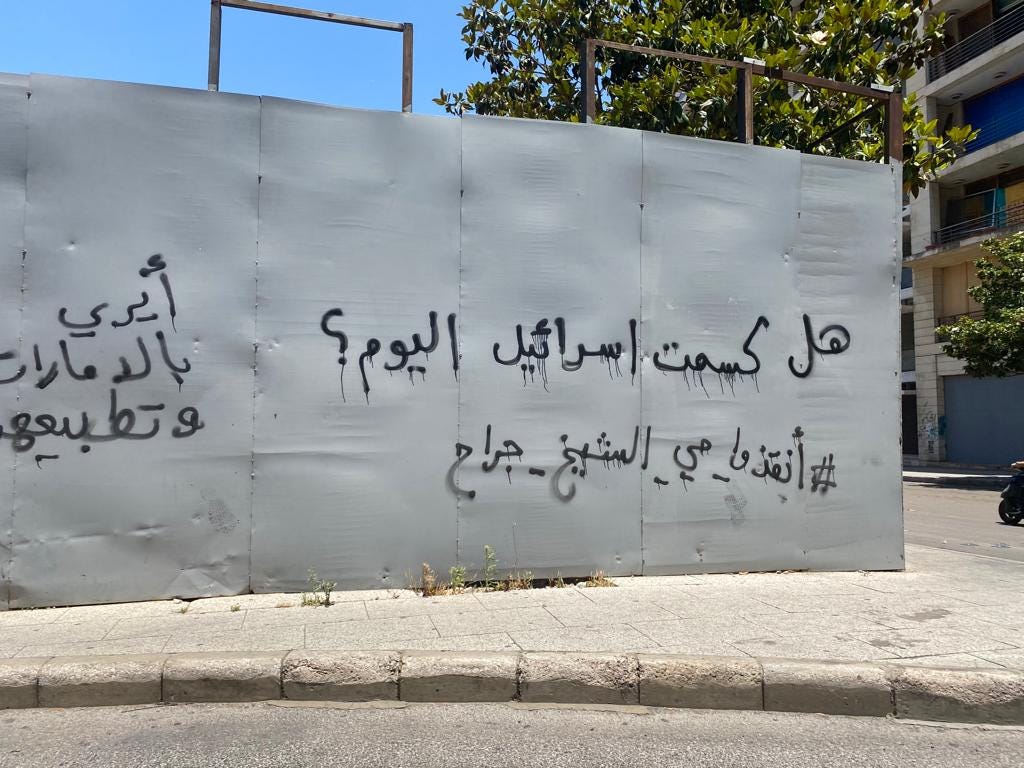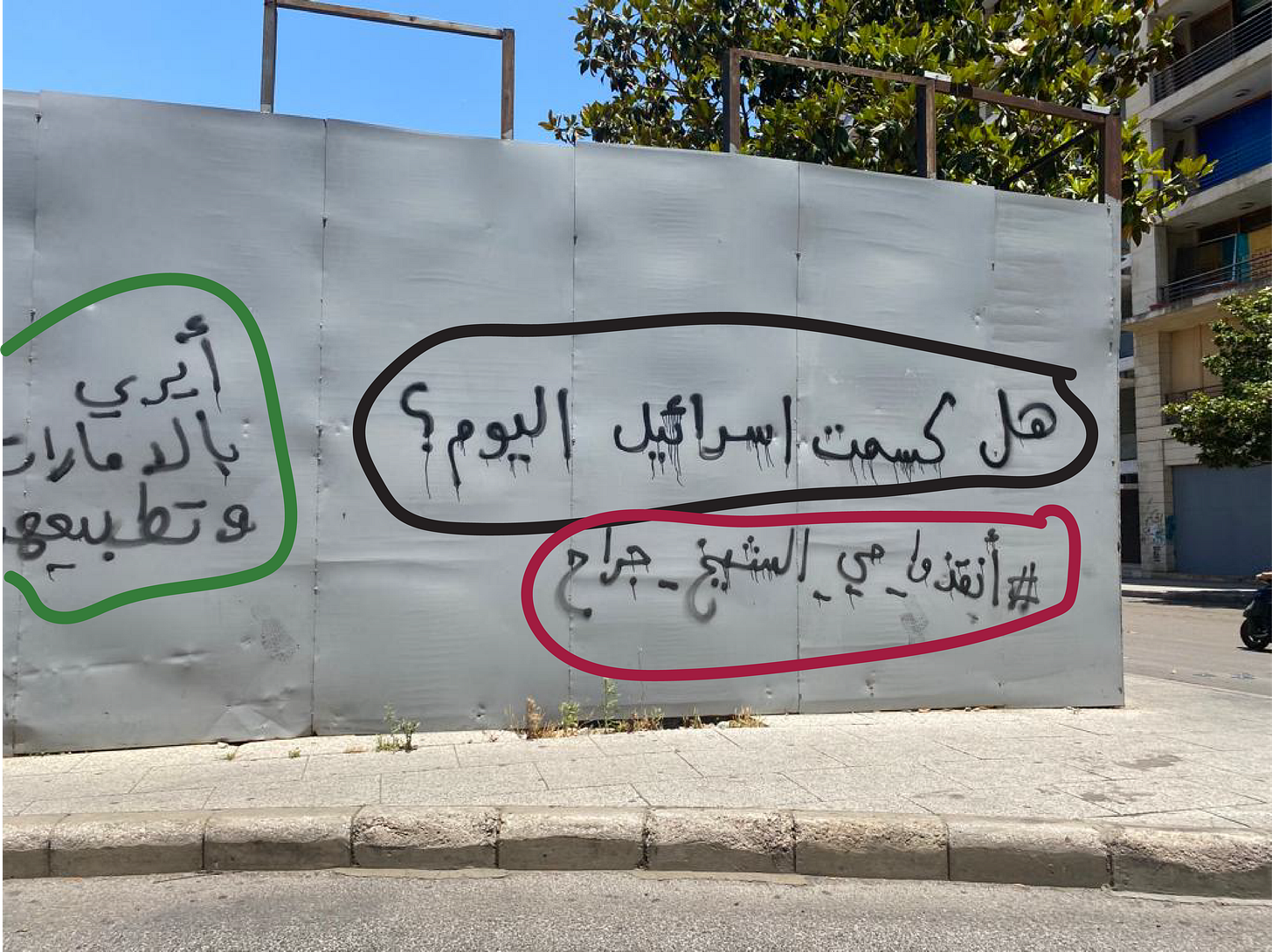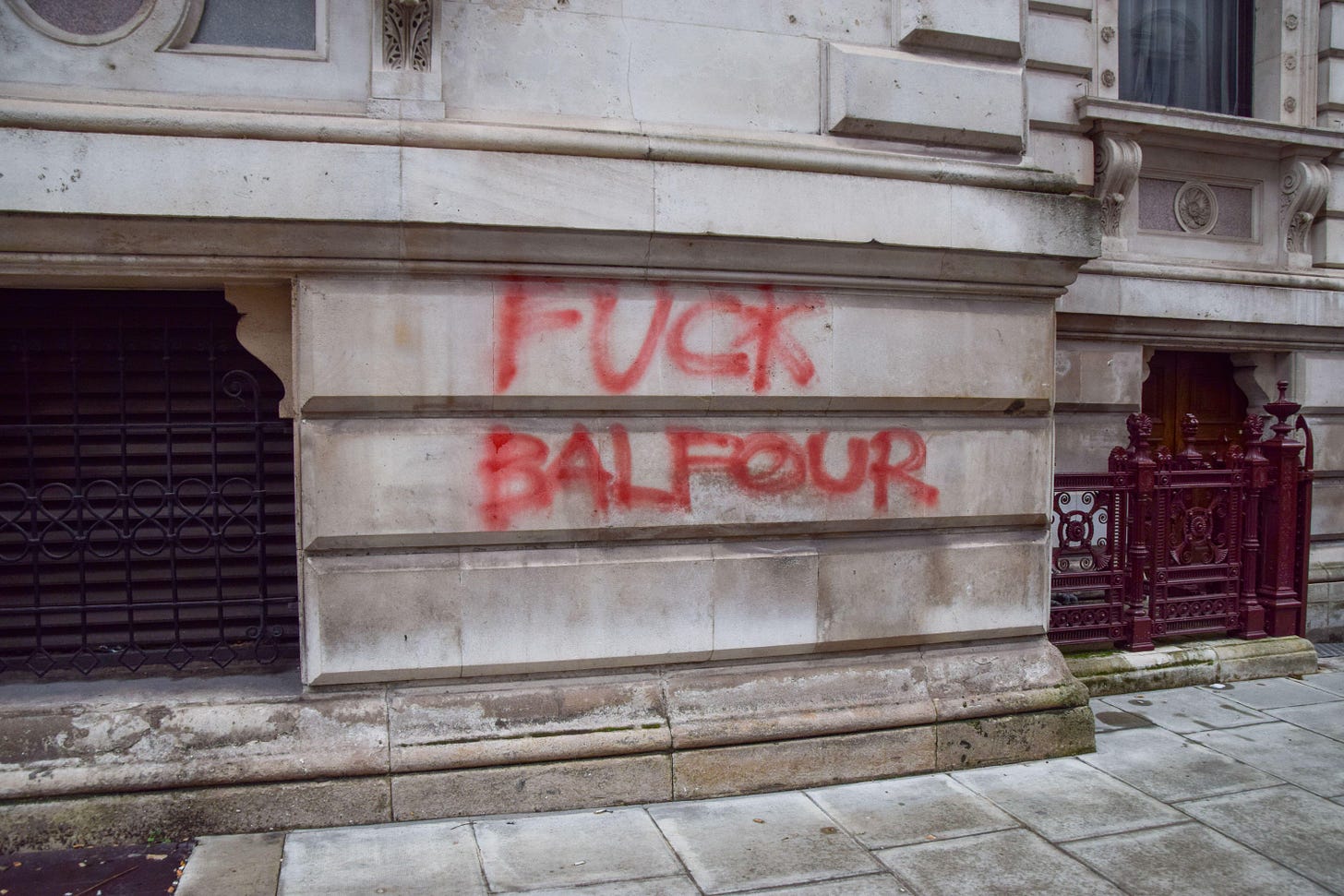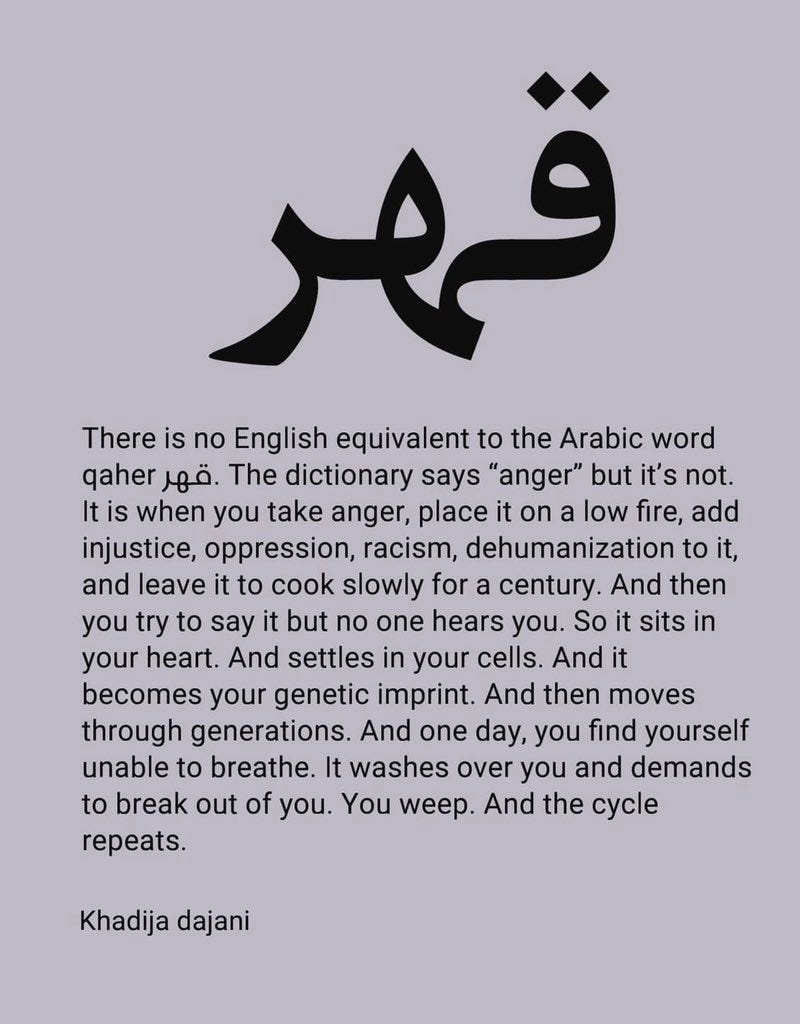He who dies here does not die by chance. Rather he who lives, lives by chance, because not one span of earth has been spared the rockets and not one spot where you can take a step has been saved from an explosion. But I don’t want to die under the rubble. I want to die in the open street."
- Memory for Forgetfulness, no. 15, by Mahmoud Darwish, Reflections on Israel’s Invasion of Lebanon and Siege of Beirut in 1982
One particular habit many Arabs in my generation inherited from our parents is an addiction to the news… and cursing it.
As a kid, I loved waking up to the sound of the iconic voices of Husam Shublaq and Mohammad al-Musallami on BBC Arabic Radio. When Big Ben’s bells tolled and the voice of al-Musallami resonated throughout the house, saying “Houna London” This is London, we knew our parents were awake, sitting next to each other drinking their coffee in silence, listening to the news. Well, at least my father sat in silence. My mother would curse every so often at the speaker on the little transistor radio sitting next to the Turkish coffee pot.
As soon as BBC Arabic wrapped up its broadcast, my father would roll the knob on the radio until its AM static landed on the Arabic news on Radio Monte Carlo. If we kids sat with them during the morning news, we were told to sit quietly. “Just listen,” my father would say.
Like the rest of the world, my parents eventually made the transition from radio to television, which is on all the time, broadcasting the news—my mother still cursing sporadically in its general direction.
In keeping with the tradition, I often keep the news on all day. The droning in the background makes me feel at home in all the homes that have never been home.
The other day, as I was working and listening to the news with one ear, I heard the droning of Lloyd Austin testifying to the U.S. Senate Armed Services Committee. I looked up just in time for him to say, with the stoic face of a general, “We don’t have any evidence of genocide being [committed] by Israel in Gaza.”
I spewed a string of swear words at the television and wrapped it up with a curse for the day Lloyd Austin’s father met his mother.
My parents weren’t pathological cursers like I am. Having grown up in the diaspora, the only place where I supposedly would have learned to curse in Arabic was at home. So, my parents were often shocked by my mastery of Arabic profanity. They chalked it up to me living alone for too long in Lebanon, where cursing is an art.
I’m not sure how our curse methodology developed, but generally, we swear at everything around the person, except the person.
For example, we don’t curse the driver who cuts us off. We curse the father or mother of the guy who gave the driver the license. We may curse his grandfather’s father or yila’an seed seedak or call him a son of 66 shoes or ibn siteh ou siteen sarmeh (as shoes imply an insult/something dirty — remember the shoes and George Bush?).
We say God damn your father, mother, religion, mother’s religion, history, creed, ancestors, etc.[i] We also say things like God damn the day I first saw you or the womb that seeded you. But never, “God damn you.” It just doesn’t roll that way.
Long before October 7, 2023, we cursed the fathers, mothers, sisters, and history of the countries that arm, finance, and grovel to the Israeli military machine that (doesn’t) occupy us and now is (not) committing genocide against us.
Going on seven months of watching our people endure what Lloyd Austin might view as self-inflicted death, devastation, and fasting, we rue the day Balfour was born and the day our people met their first Zionists. We curse the wombs that seeded the Europeans, who persecuted and massacred the Jews and turned their plight into ours. We curse the countries that barred European Jews fleeing genocide from entering their countries, only to support their takeover of ours.
On the day of Lloyd Austin’s testimony, I cursed him, and everything around him.
The cliché that a picture can paint a thousand words doesn’t necessarily mean those thousand words paint the same picture for everyone. People can interpret a thousand words any way they want. So, maybe it makes sense that the same photographs, videos, drone footage, and satellite imagery that Lloyd Austin and we see can imply very different things.
Since this piece is about the news, cursing, and the havoc perceptions can have on us, I thought I would share a photograph I have of a wall in Beirut that has only about 15 words on it. Maybe the room for interpretation is less vast with just 15 words. And, maybe not.
The first line of the graffiti in the photo above (circled in black) serves as a reminder to passersby (more than slightly paraphrased for the more sensitive reader as): Did you curse the mother of Israel today?
Below the reminder to curse Israel, the author of the graffiti added (circled in red): #Save Sheikh Jarrah Neighborhood.
This could mean a couple of things.
The author was simply cursing Israel for what it was doing in Sheikh Jarrah.
The author was cursing Israel because he simply hates Israel.
What we do know is that it was probably authored around May 2021, when an Israeli court ordered 58 Palestinians, including 17 children, to be forcibly displaced from their homes in the Sheikh Jarrah neighborhood in Jerusalem to make way for Jewish settlers to move in.
This means the graffiti predates the day history began and the world ended on October 7, 2023.
We can also assume that the last phrase, drizzling off the left of the wall (circled in green), was written by the same author (same handwriting/same spray paint). Finally, we can conclude from the statement that the author is a ‘he’ because of his colorful wish to put his penis in the United Arab Emirates and their normalization [agreement with Israel.]
The latter would be a reference to The Abraham Accords, which was signed in September 2020 and came into effect in January 2021. Also, a few years shy of when history began and the world ended on October 7, 2023.
All to say, one can understand how Lloyd Austin and other friends of Israel could interpret this photograph and its rhetoric as illustrative—and maybe even evidential—of a collective militant Arab consciousness. The photograph and its rhetoric could also be construed as evidence to back the discourse, which has prevailed for decades in Lloyd’s circles, that there is a deplorable anti-Western sentiment, deep-set antagonism to peace, and definitive predilection to anti-Semitism and wanton, genocidal intent inherent in the Arab/Palestinian.
For the average passerby in Beirut and me, it’s just a deeply felt curse that has sat at the heart of millions of Palestinians and Arabs, every day for over seven decades. For us, it’s another desperate cry to try to save another Palestinian neighborhood from being overrun by Zionist settlers. Finally, it shares the outrage so many of us feel about the never-ending betrayal of the Palestinian cause by our Arab leaders.
For us, this photograph simply shows what a typical day in Palestinian/Arab cursing may look like, born of our prolonged, simmering outrage or qaher. [ii]
And, today, this qaher only gets more and more visceral as less and less evidence accumulates of the (not really) footage of more and more (not dead) people, who are (not) bulldozed into or pulled from the rubble (that may not even be rubble.)
We can’t even keep up with the cursing.
We barely had time to curse the apparent suicide mission, carried out by hundreds of alleged militants (disguised as doctors, nurses, patients, men, women, and children) during another kind of operation at the (not-really-a-hospital) Al-Shifa, when the accidental deaths of foreign aid workers utterly confounded Israel’s (Self-) Defense Forces.
But never mind, we’ve been told to trust and hold back on more cursing until Lloyd and Co. can dissect the real evidence (they can’t share with us just yet) that will be presented in Israeli and American investigations (later) into these incidents that (never even) happened.
I printed this photograph a while back and hung it on my fridge. Not that I need a daily reminder, but it gives my exiled curses a home and my displaced, diasporic anger some peace.
A Jewish friend once shared with me that when Israelis want to curse someone in Hebrew or tell them to go to hell, they often say, “Go to Gaza.”
Well, on October 7, Gaza came to them.
Excuse another cliché but evidently, the writing was on the wall.
Photo credit: Vuk Valcic / Alamy Stock Photo / Graffiti on the walls of the British Foreign Office, Nov. 2, 2023
[i] God damn (Allah yila’an) | your father (abouk) | your mother (immak) | religion (deenak) | mother’s religion (deen ummak) | history (tareekhak) | creed (miltak)
[ii]
Instagram post by @khadija_muhaisen_dajani, linked from Khadija’s post, Message and messenger are an entangled mess of a knot lodged in my throat on Substack
Follow/share Khadija’s brilliant blog here!
Other posts on maltoot:









qaher is some kind of posttraumaticy made by acts of terror.. that terror that builded societies in the first and second and third place.. educativ indoctrinated into a system of terroristicly forced unfreedom.. the west ppl know what they've done and 50% of them do not like it.. national identities and wars grounded on national identities making nationalism which just is the suppression of weaker..
What a wonderful insight to what "the writing on the wall" really means to the Palestinian people. I think I have a little "qaher" too whenever I see/read/hear people denying what's happening in Gaza right now. My cursing just doesn't flow as well as yours--I didn't say a single curse word until I was at least 18--but it's amazing how a curse just comes out of my mouth without hesitation while reading my X/Twitter feed for the latest news stories. Thanks for sharing your writing!